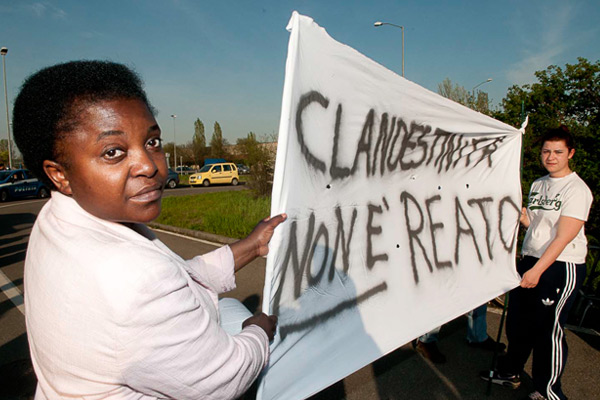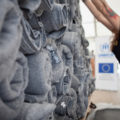The voice of the European Parliament on Migration: An interview with the MEP Cécile Kyenge
Asylum Corner: As co-rapporteur of the Initiative Report for Migrations in the Mediterranean Sea at the European Parliament, what do you think about the 10 points plan presented by Commissioner Avramopoulos during the Foreign Affairs Ministries meeting in Luxembourg last April?
Cécile Kyenge: It is important to point out that Commissioner Avramopoulos’ agenda looks at the short term, since it aims at facing today’s emergency. On the contrary, the Initiative Report that we will present at the end of 2015 represents a long-term project, since it will hopefully set the ground for future European policies.
For sure, while preparing his 10 points, Commissioner Avramopoulos kept in mind the Resolution on Migration in the Mediterranean that the Parliament voted in December 2014 and that represents the basis for our Initiative Report. There’s tight collaboration with the Commissioner, in order to better understand how to satisfy the Parliament’s requests.
There’s also another difference, though. The 10 points deal with some very specific sectors, while we want our work to be “holistic”, meaning that we want to adopt a truly global approach which could tackle many different topics at once, instead of treating them separately, in order to get rid of the widespread “emergency discourse” and start working on a more constructive, long-term perspective. We plan to set up collaborations with several humanitarian organizations, governments, civil society and so on. In a nutshell, we want to work at 360°.
About the 10 points, then, I would say I am quite satisfied but I hope that a little more will be done. The Commissioner’s plan has mainly proposed to increase the financial support to the Triton operation. Within our Initiative Report, I would rather go beyond a technical response, which does not take human lives into account, since we have seen that during the last few days, it was not Triton, but the Italian Coast Guard and the Army who rescued people at sea. And this happened because the Italian authorities that intervened went well beyond Triton’s mandate. Therefore, it is not only about increasing Triton’s funds; they [the Commission and the Council, ed.] can keep proceeding in this way, but they need to change its objectives and make them more similar to Mare Nostrum’s ones. We need search-and-rescue operations and an effective fight against human trafficking. We need to do more, we must have the courage to do more.
A-C: Let’s talk about the Initiative Report for Migrations in the Mediterranean Sea, of which you are co-rapporteur together with the MEP Mrs. Matsola from the PPE…
K: The idea of an Initiative Report is spurred from a Resolution voted into the Parliament on December 2014. The Resolution listed eight major points, which today represent the basis for our work. The most innovative element of our Initiative Report is the methodology used: we will share the work with the other groups that make up the LIBE Committee in order to include them in the workflow, so that everybody is in part responsible for it. The main aim is to avoid the risk to present a final report that will later be totally distorted by the Parliament. We want people to understand that in order to efficiently manage migration we need to set up an integrated policy, which encompasses many sectors. Otherwise, we’ll be forever stuck on the logic of emergency.
A-C: In more details, what are the guidelines you will be working on?
K: As I previously mentioned, our work will focus on 8 points.
First, we will work on art. 80 [of the TFEU, ed.] about solidarity and shared responsibility, including search-and-rescue activities, which is one of the most important elements (and also meets the Commissioner’s priorities).
Second, we will tackle the human trafficking issue. In this category, we included also the exploitation of irregular migrants once they get on the European soil. Therefore, human trafficking for us means both smuggling and work exploitation on European territory.
The third point concerns border control and visa policies, including the role of Frontex and other EU agencies. After that, with the fourth point, we want to investigate new ways to provide legal access to asylum seekers, including resettlement and integration policies. The tool of resettlement is still rarely used in Europe. Last year, we managed to meet the UNHCR’s requirements mostly thanks to Germany, which resettled 30.000 refugees out of a total number of 36.000. Thus, we want to start pilot projects that could be later integrated in a more structured system.
A-C: Let’s jump to the fifth point…
K: The fifth point deals with the cooperation strategy with Third Countries, with programs of regional protection, resettlement, returns and analysis of the root causes of the migratory phenomenon. This is also a point we agree on with Commissioner Avramopoulos, who understands the need to invest more in the Rabat and Khartoum Processes; however, we would also like to stress the importance of placing the respect for human rights at the core of such collaboration between the EU and Third Countries, to avoid making the same mistakes from the past, as with the Italian-Libyan Agreement.
We believe it is fundamental to guide troubled Countries towards democracy, peace and the end of conflicts, so that every citizen can have the chance to decide whether to stay at home or leave.
The sixth point concerns the development of legal channels for economic migration. An overhaul of the EU directives on migration is needed in order to stop forcing people to resort to criminal networks to get into Europe.
Point seven, we plan to analyze how European Home Affairs funds are used by the Member States in the field of migration policies. After what happened in Italy with the “Mafia Capitale” investigation, we feel it’s fundamental to dig into it further.
The last guideline deals with the implementation of the European Common Asylum System and the role of the European Asylum Support Office. We need to start thinking about a recast of the Dublin Regulation, which could allow for the mutual recognition of the asylum status among European Member States. It will be a tough work of mediation among all political groups but it will be an important step to get out of demagogy and finally present a draft that will radically change our policies.
A-C: Recasting the Dublin Regulation will mean raising the topic of solidarity among Member States again…
K: Of course it will. We will analyze how to achieve an equal redistribution among the Member States. The Initiative Report will investigate the reasons why some Member States have not applied the asylum directives, and why they never committed to receive refugees and to resettle them. Since applying these EU directives was not obligatory, some Countries decided not to comply with them: and this clearly represents a sign of weakness in the European Union.
It is hard to say, now, what we will achieve with the Initiative Report. I have my own ideas, but I will have to mediate with many political groups in order to present a coherent and common Report.
A-C: As for searching a compromise, you mentioned before the possibility of opening legal channels for migrants. Don’t you think that such a proposition will inevitably lead to a major clash with those political forces that strongly oppose the arrival of all kinds of migrants to Europe?
K: I will answer you with a short but powerful comparison. Let’s take a look at Lebanon: 4.5 million inhabitants, 1.2 million refugees from Syria. Despite a very complicated situation, Lebanon still manages to host all these people. In 2014, Europe received 250.000 asylum seekers/migrants with a population of 500 million people, in a highly industrialized, relatively wealthy continent.
The economic crisis hit many people in Europe, but we should not mix up the lack of a real political and economic response with the refugees’ reception and solidarity system. The real crisis is the political impasse that the European Union is experiencing at the moment. When people find themselves in such situation, they start looking for a scapegoat, and in this case it is somebody who comes from abroad, somebody who “comes to steal their job”.
So, if I take Italy as an example (64.000 refugees with a population of 60 million) and I compare it with Lebanon, it would be like if Italy was to host 15 million refugees. Then, people might have some reasons to protest. But between 15 million and 64.000 there is quite a difference.
In my opinion, the right way to go is to recognize that the problem is not receiving refugees but rather the lack of a political answer, of a common vision and of the courage to make decisions in order to manage migration better. When I look at the numbers, I ask myself: what are we really talking about?
The points we have presented for the Initiative Report try to work on the causes of the migratory phenomenon. We will work with Africa, where the European policies until now have been quite shortsighted. Working with Africa means giving the opportunity to many countries to choose their own authorities. By strengthening the governance and the democratic institutions and culture, we can help Africa to build political stability, providing the possibility to every citizen to choose whether they want to stay or not.
Today Africa is definitely not a stable continent. It’s in continuous evolution, it ferments, and I believe Europe can guide these Countries towards peace and democracy, so why don’t we do it?





